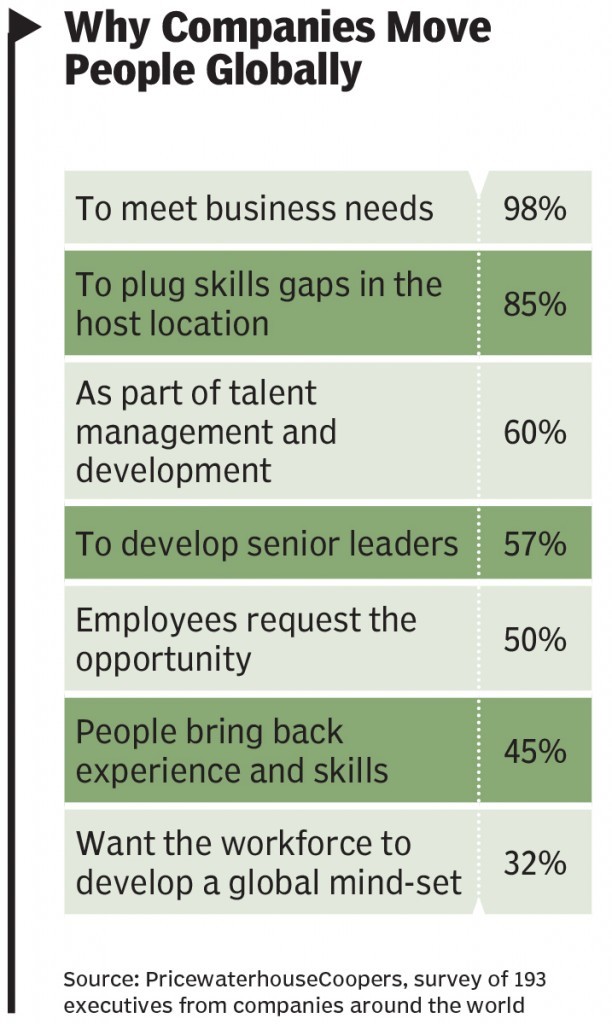
A majority of companies find that they’re not getting „good value for money“ spent on sending employees abroad, PwC says. Most companies don’t think they’re getting a sufficient return on investment from sending employees abroad, new PricewaterhouseCoopers research reveals. Global Mobility fails to deliver desired ROI.
 But apparently they also think there’s opportunity ahead, as a vast majority of companies plan to do more of it in the near future.
But apparently they also think there’s opportunity ahead, as a vast majority of companies plan to do more of it in the near future.
Only 42% of the 193 executives who participated in a PwC survey said their global mobility efforts deliver “good value for money.” Yet 89% said they expect to increase the number of internationally mobile workers in the coming two years, and 85% said mobility is important for meeting business needs.
Perhaps, though, companies are getting a better return on mobility than they think. According to the research, only 8% of companies are able to put an accurate cost on their mobility programs and just 9% measure the return on investment.
Still, ROI estimates for international assignments are filled with subjective elements, like the value of skills acquired or the value of training the employee may provide to local staff, says Peter Clarke, PwC’s network leader for global employee mobility services.
“A lot of that is very fuzzy,” Clarke says. “I’ve never seen a company do a great job with a sustained effort on ROI. Companies do bake an annual assessment of [such] value into the talent management process for these people, but it’s a formulaic approach.”
At the same time, there is no denying that the cost of international assignments is large, in most cases at least twice the employee’s salary, according to Clarke. “I’ve never sat down with a business executive to show a projection for the cost of an assignment and heard that person say, ‘Wow, that seems really reasonable.’ There are so many hidden costs, and nobody has really cracked the code on reducing the costs.”
Risky Business
While the cost of anything is always an issue for companies, a big motivation for CFO involvement in overseeing cross-border moves has to do with enterprise risk.
There are still plenty of traditional international assignments, in which a company sends an employee and his or her family to another country for, say, three to five years. But now many assignments are shorter-term, including “mobility without moving” arrangements where, instead of the employee’s family moving, the employee spends an aggregate five or six months in the other country in short visits throughout the year.
That’s where much of the risk lies, says Clarke. The first issue is immigration. Say you have gas turbines operating in an African county, and you send field engineers to fix the turbines. They may be going in for three weeks, but do they have the right permit to get into the country and do the work?
“If the [foreign] government finds out you have multiple people coming in without the right work permit or visa, the people can be detained, and you can even have your right to do business there revoked,” Clarke says.
Failure to procure work permits might seem like an uncommon problem, but it’s not, says Clarke. One effect of the short-term nature of such assignments is a lack of oversight. “These nontraditional mobile people are often not on plans that are tracked by mobility teams,” he says. “No one is paying attention to how many there are or where they are or what they’re doing. No one is minding the store.”
Another risk issue that’s a problem for the same reason is taxation. In most cases, employees who stay in a country for three or four months incur tax liability. But has the proper payroll been set up? Is the company remitting the right amount of tax? “This can become a significant liability if you’re grossing up the tax,” Clarke says.
Indeed, he notes, “We’re seeing financial executives start to pay attention to this, more than they ever have. They’re not necessarily getting involved, but they’re pushing for organizational sponsorship to get someone to monitor this and put some systems and controls around it.”
Waste Not, Want Not
A key reason why companies are not getting the desired value out of mobility is that many of them “waste considerable time sending the wrong people to the wrong places, overpaying for ex-pats when local talent is available, or offering large financial packages when people are more motivated by the development opportunity,” says Clarke.
The company is motivated by the development opportunity as well. Clarke says he sees opportunity for companies to create a culture of mobility, where international assignments are tied in some measure to succeeding in the organization. Rather than making out on packages and allowances, young, mobile employees should emphasize the experience and skills gained.
It’s rare that a company literally forces an employee to take a global assignment, but saying “no” might put a mark next to a person’s name. “For some of our clients, if a person says ‘no’ twice, he or she comes off the high-potential list,” Clarke says.

 Seite drucken
Seite drucken